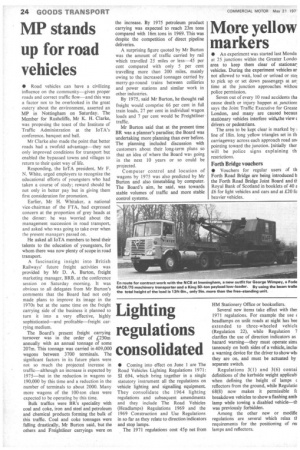MP stands up for road vehicles
Page 26

If you've noticed an error in this article please click here to report it so we can fix it.
• Road vehicles can have a civilizing influence on the community—given proper roads and correct traffic flow—and this was a factor not to be overlooked in the great outcry about the environment, asserted an MP in Nottingham on Saturday. The Member for Rushcliffe, Mr K. H. Clarke, was proposing the toast of the Institute of Traffic Administration at the IoTA's conference, banquet and ball.
Mr Clarke also made the point that better roads had a twofold advantage—they not only improved conditions for transport but enabled the bypassed towns and villages to return to their quiet way of life.
Responding, the IoTA president, Mr F. N. White, urged employers to recognize the educational efforts of youngsters who had taken a course of study; reward should be not only in better pay but in giving them first consideration for promotion.
Earlier, Mr H. Whitaker, a national vice-chairman of the FTA, had expressed concern at the proportion of grey heads at the dinner: he was 'worried about the management succession in road transport, and asked who was going to take over when the present managers passed on.
He asked all IoTA members to bend their talents to the education of youngsters, for whom. there was now plenty of scope in road transport.
A fascinating insight into British Railways' future freight activities was provided by Mr D. A. Burton, freight marketing manager, BRB, at the conference session on Saturday morning. It was obvious to all delegates from Mr Burton's comments that the Board had not only made plans to improve its image in the 1970s but at the same time on the freight carrying side of the business it planned to turn it into a very effective, highly sophisticated—and profitable—freight carrying medium.
The Board's present freight carrying turnover was in the order of £230m annually with an annual tonnage of some 207m. This tonnage was carried in 409,000 wagons between 3700 terminals. The significant factors in its future plans were not so much the projected increase in traffic—although an increase is expected by 1975—but in the reduction in wagons to 190,000 by this time and a reduction in the number of terminals to about 2000. Many more wagons of the 100-ton class were expected to be operating by this time.
Bulk traffics were BR's speciality with coal and coke, iron and steel and petroleum and chemical products forming the bulk of this traffic. Coal and coke tonnages were falling drastically, Mr Burton said, but the others and Freightliner carryings were on the increase. By 1975 petroleum product carrying was expected to reach 23m tons compared with 16m-tons in 1969. This was despite the competition of direct pipeline deliveries.
A surprising figure quoted by Mr Burton was the amount of traffic carried by rail which travelled 25 miles or less-45 per cent compared with only 5 per cent travelling more than 200 miles, mainly owing to the increased tonnages carried by merry-go-round trains between collieries and power stations and similar work in other industries.
By 1975, said Mr Burton, he thought rail freight would comprise 66 per cent in full train loads, 27 per cent in individual wagon loads and 7 per cent would be Freightliner traffic.
Mr Burton said that at the present time BR was a planner's paradise; the Board was undertaking more planning than ever before. The planning included discussion with customers about their long-term plans so that an idea of where the Board was going in the next 10 years or so could be projected.
Computer control and location of wagons by 1975 was also predicted by Mr Burton and also timetabling by computer. The Board's aim, he said, was towards stable volumes of traffic and more stable control systems.






























































































































